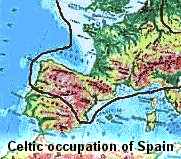Critics, theories and facts
I have received some criticism about mentioning Celtic influence on flamenco music and dance. One Spanish gentleman argued that the Celts were in Spain too long ago to be credited with influencing an art form that is essentially only a couple of centuries old. He said I shouldn't be saying that Farruca and Garrotín were of Celtic origin, but a product of the modern inhabitants of the northern province of Galicia. Mmmm! This is really fascinating because we seem to have stumbled on a paradox here, or rather a conflict of perception. Isn't it interesting that despite this criticism, some Galicians consider themselves Celtic, as opposed to Iberian or Spanish. (see first reference below) I'm sure this critic would argue that the Greek influence upon flamenco is non existent since they were in Spain so long ago. Maybe. Maybe not. How can you conclusively prove or disprove such a thing. And what about Indian influence? Should we dismiss this also? Have you ever closely observed the hand and foot movements of northern Indian dancers? If you get a chance, have a look and tell me what you think. Anyway, in the case of the Celtic connection, I'm only repeating what other, more knowledgeable flamenco commentators have said.
Hazy cultural inheritance
 The fact remains that the Celts were there (they entered Spain around around 1,200BC) and so were the Greeks, Romans,
Phoenicians and many other ancient peoples. To make things interesting, here's something to think about. Even though the Barbarian
tribes in the region around the time of the Romans are not remembered because of their dancing skills, how do we know for sure that the
settled Celts in the North did not borrow a few ideas from them? Does this sound kind of silly to you? Well, let us not forget that the
Celts had many "barbarian" characteristics themselves. They were not all romantic harps and pretty songs. For the record, they were
tall, ruthless warriors who struck terror in the hearts of seasoned Roman soldiers. By the same token, the Barbarians must have had
their quiet, reflective moments also, complete with unique songs and dances. Having come this far, let's stretch credibility a little
further, shall we. Much as the Celts hated the Romans, are we to believe that the two peoples never got close enough to hear each
other's music or watch the dances? Questions, questions. My point is that simply pouring cold water on a hypothesis because it's not
written in a leather bound textbook indicates a sad lack of imagination. It also indicates an even sadder inability to think outside the
academic circle.
The fact remains that the Celts were there (they entered Spain around around 1,200BC) and so were the Greeks, Romans,
Phoenicians and many other ancient peoples. To make things interesting, here's something to think about. Even though the Barbarian
tribes in the region around the time of the Romans are not remembered because of their dancing skills, how do we know for sure that the
settled Celts in the North did not borrow a few ideas from them? Does this sound kind of silly to you? Well, let us not forget that the
Celts had many "barbarian" characteristics themselves. They were not all romantic harps and pretty songs. For the record, they were
tall, ruthless warriors who struck terror in the hearts of seasoned Roman soldiers. By the same token, the Barbarians must have had
their quiet, reflective moments also, complete with unique songs and dances. Having come this far, let's stretch credibility a little
further, shall we. Much as the Celts hated the Romans, are we to believe that the two peoples never got close enough to hear each
other's music or watch the dances? Questions, questions. My point is that simply pouring cold water on a hypothesis because it's not
written in a leather bound textbook indicates a sad lack of imagination. It also indicates an even sadder inability to think outside the
academic circle.
| << Previous [1] 2 3 Next >> |


